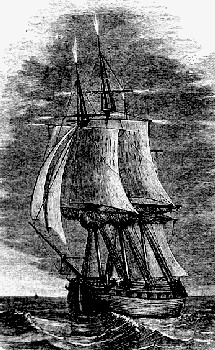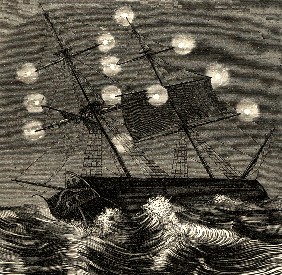
Halloween - Pompions and Ghostly Tales: 1 2 3 4 5 6 Next>>
Pompions, Monsters and Ghosts in the Golden Age of Piracy, Page 3
Ghostly Tales
"[1686] But it is strangely observable, that whilst they were loading their Guns, they heard a voice in the Sea,
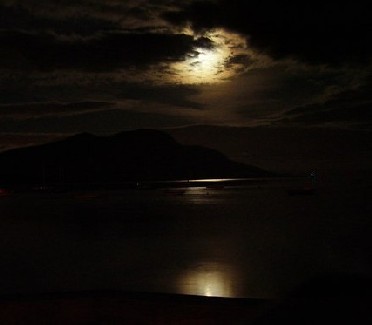
Photo: Alan Murray Walsh
crying out, Come help, come help, a Man over Board, which made them forthwith bring their Ship to,
thinking to take him up, but hearing no more of him. Then they came on Board of us to see if we had a Man wanting, for upon strict examination we found that in all the three Ships we had our Complement of Men, which made them all to conjecture, that it was the Spirit of some Man that had been drowned in that Latitude." (William Ambrosia Cowley, Cowley’s Voyage Round the Globe, from A collection of original voyages (1699) edited by William Hacke, p. 40-1)
Sailors were notoriously superstitious men, often blaming their misfortunes on people, places and things. An account of all the multifarious superstitions adopted by this group throughout the ages would be a web page unto itself. However, there are some interesting ghostly stories that appear in golden age of piracy sailor's and surgeon's accounts. Let's look at a few a few of them.
Dietz's Ghost Stories
Barber-surgeon Johann Dietz spins several diverting ghostly yarns. The first comes from his travels as an itinerant barber-surgeon in Germany . It reads like the best of such tales, so I am quoting it as written. (I have inserted paragraph breaks in addition to those already in the text to make it more readable on-line.)
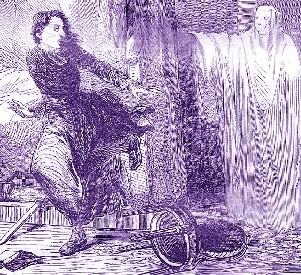
Artist: Labeauce et Minne
Apparation Dame Blanche au Chevet d'un Mourrant (1857)
When I went to bed, about eleven o'clock, at which time the women [his cousin and her maid] were asleep, I heard a frightful stumbling and tumbling in the house, which increased my fear, because in the stable, when I had unsaddled and fed my horse, he pulled for some time at the hay, and then all his hair stood on end, and he turned vicious, snorting and refusing to eat or drink.
The noise in the house continued for some time, until at last something came downstairs, and went all over the house, and began to bounce about in the courtyard. I knew there was no one else in the house; for which reason my fear and anxiety were all the greater. From the courtyard it came straight into the kitchen, and to judge by the clatter in the stove it seemed as though it were lighting the fire. I was sweating with anguish and did not know what to do. Meanwhile the lamps had gone out.
I called and shouted to wake the women. But there was no reply. At last it came out of the kitchen and went past the door of the living-room, toward the front door, by which it went out, violently banging the same behind it. I could hear it scratching at the door of the living-room, as though unable to find the latch. But almost at once it opened the door, so that it crashed back against my bed.
It was no longer possible to lie there. And if I had previously prayed — which I was used to doing — I now cursed, which I should not otherwise have done. Therewith I leaped out of bed and violently banged the door to again.
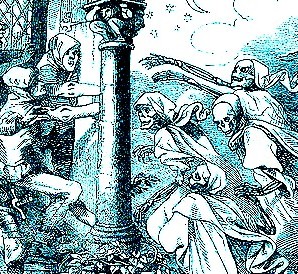
Apparitions Trying to Get In from Collin
de Plancy's Dictionnaire Infernal (1818)
I went over to my cousin and seized her by the arm, and at last waked her, whereupon she asked me: "What is it, then? What is it? "
"Oh, cousin, I don't know, I don't know whether it's the Devil or his grandmother in the house! I can't stay here!"
And who would not have been afraid, if at midnight, without a light, a ghost were thus to burst open the door and snuffle over him like an ox — even had he been the bravest man in the world?
But my cousin must already have known all about the matter, for she said: "Why, cousin, be easy, it will not hurt you in any way!"
To which I said: "Huh ! Well, it won't suit me: why, I might have been frightened to death!"
The maid was still asleep. I seized her by one leg and pulled until she woke up and lit a couple of lamps. While the lamps were being lit a black cloud moved hither and thither in the room. Further than this we saw nothing.
I reflected upon the matter afterwards and concluded that it was of the nature of omina, or a prelude to my coming [army] campaign in Hungary. And I ought to have taken warning from it....
And why did I not escape from this perilous march, since it appeared to me so full of evil and wretchedness? — Because it was to be. God wished me to experience these things that I might tell men how the Lord has dealt with my soul.1
You can't help but wonder what the devil's grandmother was like.
While he was quite
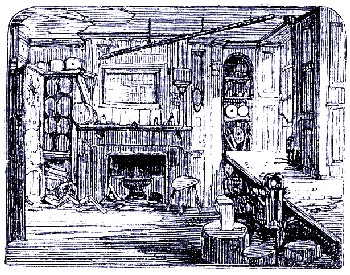
Artist: Charles Mackay
The Haunted Room at Cock Lane (1852)
superstitious, giving an account containing ghosts, demons and even a werewolf, Dietz was also a fervently religious man, hearkening repeatedly to God in his stories.
In a discussion on "Devils, evil Spirits, Incubi, Succubi, Hobgoblins, Faries, Robin-good-fellows, evil-Angels, Sathan, Lucifer, the father of lies, Prince of darkness and of the world, Legion, and other names agreeable to their offices and natures"2, French surgeon Ambroise Paré offers support for Dietz's house ghost tale. He reveals that evil spirits "houl on the night, they murmure and rattle, as if they were bound in chains, they move benches, tables, counters, props, cupboards, children in the cradles, plaie at tables and chess, turn over books, tell monie, walk up and down rooms and are heard to laugh, to open windows and doors, cast sounding vessels, as brass and the like, upon the ground, break stone-pots & glasses, & make other the like noises."3
During his wanderings, Dietz agreed to serve as surgeon aboard a Dutch whaling vessel, where he provided several sea-going spiritual accounts. The first is from a storm that struck the ship during a voyage.
...the wind had become so powerful, and the storm so violent that the waves kept on leaping sky-high, and the sea before the ship burned as though it had been very fire and flame, as it used to look at night by reason of the particles of salt. We were forced in the end to shorten sail, for the ship was continually driven nearer to the cliffs that lay to the north of us, so that every moment we thought to suffer shipwreck, when all must have been drowned, since the cliffs in those parts rise to a very great height from deep water, and there is no beach, as we saw with our own eyes.
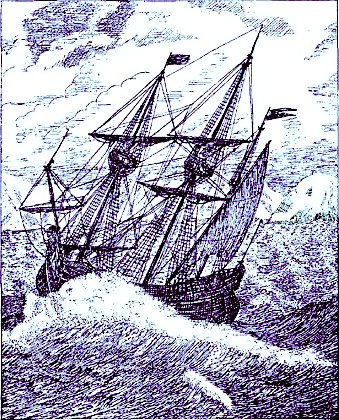
Ship in a Storm in the Atciic From Spitz Bergische Greenlandic
by Friederich Martens (1675)
We commended ourselves to God, and set to work with all our might to escape from the cliffs and crags, which I actually saw close to the vessel when the sea abated. The terrible wind hurled the oncoming waves against the rocks with such violence that they burst, flinging their spray in all directions to a distance of fifteen to twenty yards, like sparks from a forge.
Our consorts were in no better case; and we were no longer together, for the storm had scattered us. We were all half dead of privation; and there were times when we cried "Breakers ahead!" at every moment, for the ship was like to run upon the rocks.
I saw with terror something large and of a moss-green colour, like a hill or a piece of land, which continually floated beside our vessel, no matter how we might alter our course.
To this day I do not know what it was. Others who saw it knew no more than I. Several were of opinion that it was a drifting piece of land. Others took it to be a phantom or sea-ghost.4
One can quickly see the sailor's superstitious nature at work there, assigning an other-worldly explanation to something that could be much more simply explained. Dietz gives another account
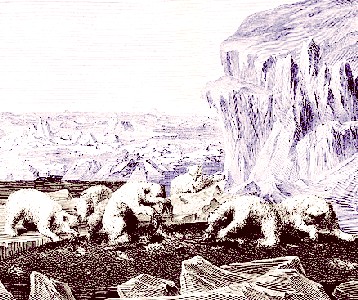
Polar Bears Eating From Die Gartenlaube, p93 (1871)
of a ghostly presence on a second voyage in the same ship. The carpenter of the ship "died on board ship of a wasting illness and was long bed-ridden. I saw him many times and warned him of his approaching death and admonished him to pray diligently; as did the commander and others likewise. But he would not hear of this, as he was an atheist, which was the reason why he had never come to prayers."5
Dietz goes on to explain that the carpenter "lived like a beast, he died like a beast, and was buried like a beast; for he lay dead in his berth before anyone was aware of his death. There was very little ado made about the matter; we carried him upon deck, bound him to a plank, and four or more men seizing it, they sang: "Hory sond, Hory sond, Hory see," — and therewith pushed him overboard into the sea, whereupon he floated in the wake of the ship. Whether the [polar] bears ate him, or the seals, I know not; but his ghost was repeatedly seen on board the vessel. This is a matter that I shall not discuss."6
His
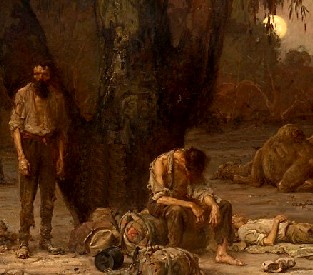
Artist: John Longstaff
Finding a Deserted Camp, from The Arrival of Burke,
Wills and King at Cooper's Creek
last account of spooks at sea is secondhand, but not without merits as a story. It even features a surgical aspect.
We did indeed put ashore, in order to provide ourselves with fresh water for the homeward voyage, since there were springs there. — This was the very place where the Dutch had at various times attempted to remain through the winter, and one could still see the rudera [ruins] of their buildings, walls and foundations; but they were never able to lay claim to the land, since they all died in a most pitiful fashion, terribly plagued by spectres, ghosts and bears, and at last they became all twisted and doubled up with scurvy, and were found dead.7
The settlers had chosen a location so far north where, as Dietz explains, "It is not possible that human beings should live there in winter, on account of the great cold, the snow and the darkness"8. While such conditions in combination with spectres, ghosts and polar bears would make for a miserable wintering spot, it sounds as if the lack of fresh fruits and vegetables had more to do with their demise.
1 Johann Dietz, Master Johann Dietz, Surgeon in the Army of the Great Elector and Barber to the Royal Court, Translated by Bernard Miall, p. 48-9; 2 Ambroise Paré, The Workes of that Famous Chirurgion Ambrose Parey, p. 665; 3 Paré, p. 666; 4 Dietz, p. 141-2; 5 Dietz, p. 148; 6 Dietz, ibid; 7 Dietz, p. 136; 8 Dietz, ibid
Corposans
Dr. John Covel gives a most diverting account in his diary on November 9th, 1670 when his ship was traveling near Zakynthos (a Greek island in the Ionian Sea). I have inserted some paragraph breaks into his text for readability.
Wednesday, Nov. 9th. The Sailors that had been on the watch told me that in the night, after the
St. Elmo's Fire on the masts from The
Aerial World by Dr. G. Hartwig (1886)
storme was over, they had seen two little Lights, one at the foremast top, the other hanging upon one of the main stayes. They call'd them Corposans; I suppose from Corpo Santo [Holy Spirit], as the Italians name them, believing them to be the Ghosts of some saints who come to relieve them. But our men would hardly be persuaded but that they were not some Hobgoblins or Fairies, or the inchanted Bodyes of witches...Our seamen assur'd us that in many voyages to the Indyes and elsewhere they have seen sometimes six or seven together (sometimes many more parted or splintr'd into small globulor sparks, like pills), and hanging as it were on the yards and sails, or upon the masts, but most commonly aloft... not above thre at most (and that most rarely) are mentioned as ever seen together by the antients, viz. as our Ships are bigger, and of more ballast and burthen, so their masts and yards and riggings are caryed much higher, and by consequence more of that unctious gleam, which after the dissolution of the clouds and ceasing of the Tempest remains dispersed in the Air, and affords matter for these Meteors, is rather aloft than nearer to the Hull of the ship, and so is more plentifully met with all by the upper rigging and tackles, and cleaves to them.
And asking farther about this point, they [the sailors] told me these lights are oftner seen and more together upon a tall ship then upon a pinnace or small vessel. ...the next night (Nov. 9) ...after very much Thunder and Lightning and tempestuous weather, about four o'clock appear'd two more, one towards the main top, which disappeared before I got out, the other was at the very top of the fore-mast. They told me it was beginning to fade. It seem'd a dim light, as of a flame, shining through a steam or smoak, about the bignesse and shape of an ordinary egge, the top a little wavered, and growing fainter and lesser it soon went out.
St. Elmo's Fire on the masts and spars from
Naturwunder Im Reiche der Luft by Dr. W.F.M.
Zimmerman, p. 304 (1860)
When I came back into the great Cabin, there appear'd a Circle about the candle which stood on the Table; I would call it rather a Halo, because it was very little coloured. The farther we were from it the plainer it appear'd and bigger (almost as broad as both my hands); as we came nearer to it it lessen'd proportionably, and just at it we could not perceive it, all which depended on the various refractions through the moist and mixt vapours which then fill'd the Air.One of our Mates told me that once, as he sailed formerly in these streights, there appear'd a very bright Helena at the very spindle of the main top mast, and one of their men went up and moved his hand round about, and neither saw nor felt anything, when they below saw it all the time. We sent up one to ours, but before he got at it it went out; perhaps his approaching might move and part the Air, and contribute something to its so soon vanishing.1
What Covel was describing is what is now popularly referred to as St. Elmo's Fire. This is a mixture of gas and plasma, similar to the flame which appears above a burning object. It occurs when the atmosphere is charged following storms. The ionization of the air molecules produces a faint glow that is easily visible in low-light conditions, appearing as bright blue or purple glow above tall, sharply pointed structures such as lightning rods, chimneys, ship's masts and even leaves and blades of grass. The sharper the point is on an object, the lower the atmospheric voltage levels are required to produce the phenomenon.2
1 John Covel, Extracts from the Diaries of Dr. John Covel, 1670-1679, Early Voyages and Travels in the Levant, J. Theodore Bent, Ed., Hakluyt Society, p. 126-8; 2 St. Elmo's Fire, wikipedia, gathered 10/24/12
The Fearful Comet
Speaking
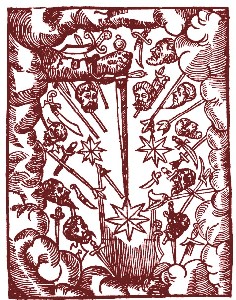
The Fearful Comet from The
Workes of
That Famous
Chirurgion Ambroise
Parey, p. 695 (1649)
of frightening phenomenon in the night sky, 16th/17th century French surgeon Ambroise Pare regales his readers with an extraordinary account of a 'fearful comet.' He includes comets in his chapter on "monsters and prodigies", noting that "for monsters to appear in the heaven, and in the upper region of the air, exceed's all admiration."1 He then gives a vivid and somewhat harrowing description of the 'fearful comet.'
Antiquitie hath not seen anie thing more prodigious then that Comet which appeared with bloodie hair in Uverstine, upon the ninth daie of October, 1528. for it was so horrible and fearful a spectacle, that divers died with fear, and manie fell into grievous diseases; going from the East to the South, it endured no longer then one hour and a quarter: in the top whereof was seen a bending arm holding a great sword in a threat'ning hand; at the end thereof appeared three stars, but that over which the point of the sword directly hanged was more bright and clear then the rest: on each side of this Comet were seen manie spears, swords, and other kindes of weapons died with blood, which were intermixt with men's heads, having long and terrible hair and beards, as you may see in this figure."2
1 Ambroise Paré, The Workes of that Famous Chirurgion Ambrose Parey, p. 694; 2 Ambroise Paré, p. 695

